This week we also have the benefit of discussing a paper going out for review in a short time. Again, for reasons of anonymity, we do not tell you more about it besides that it is dealing with Incident Command Organizations and the way they learn.
Discussing paper on routines and ski guiding
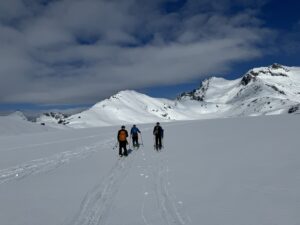

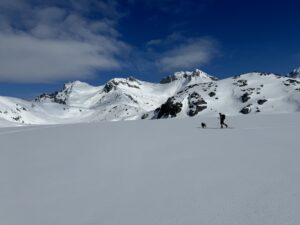 The other week TripleED discussed a paper on the routines of ski guides in order to handle some review comments. For the sake of review anonymity we do not go into further detail, but invite you to enjoy the beauty of skiing terrain (see photos).
The other week TripleED discussed a paper on the routines of ski guides in order to handle some review comments. For the sake of review anonymity we do not go into further detail, but invite you to enjoy the beauty of skiing terrain (see photos).
Weekly TripleED seminar – Creative Design workshop
 Creating figures, models, and visualizations of our results is as much part of academia as the texts themselves. As a continuation of Oscar´s talk on visualising data at Skeppsvik Natalie will be doing a creative design workshop for our next TripleED session on Thursday 11 April between 9am – 11 am. She will share some thoughts on design and give a short introduction to using the Affinity software. Then we will all have a go at re-designing one or two models* and discussing ideas as a group.
Creating figures, models, and visualizations of our results is as much part of academia as the texts themselves. As a continuation of Oscar´s talk on visualising data at Skeppsvik Natalie will be doing a creative design workshop for our next TripleED session on Thursday 11 April between 9am – 11 am. She will share some thoughts on design and give a short introduction to using the Affinity software. Then we will all have a go at re-designing one or two models* and discussing ideas as a group.
Weekly TripleED seminar and guest presentation: Anna Fahlgård Lahache
 It is our pleasure to welcome Anna Fahlgård Lahache to Umeå and TripleEd. Anna will meet with the TripleED “gang” and give a talk on her dissertation work titled “The analogue work of digital transformation: Essays on digitalization of public administration from an institutional work perspective. Please find Anna’s bio below.
It is our pleasure to welcome Anna Fahlgård Lahache to Umeå and TripleEd. Anna will meet with the TripleED “gang” and give a talk on her dissertation work titled “The analogue work of digital transformation: Essays on digitalization of public administration from an institutional work perspective. Please find Anna’s bio below.
If you happen to be close by the talk will be given in SAM A 333 at 9am, tomorrow Thursday the 29th.
Anna’s bio below
Bio: Anna Fahlgård-Lahache is a PhD Candidate at Stockholm School of Economics, Dept. of Entrepreneurship, Innovation and Technology, and researcher at Totalförsvarets Forskningsinstitut (FOI). Anna’s dissertation research explores the emergent, non-digital, work of doing digital transformation in public administration, in the contexts of Sweden and Taiwan respectively. Departing from a practice-process perspective, her compilation thesis comprises of three essays using longitudinal field studies and archival data. Her dissertation contributes to theory on institutional work in digitalization of public administration, foregrounding aspects such as organizational identity-, policy, legitimacy, temporal- and narrative work.
Derin Kent and Gloria Kutscher giving a talk on “Extreme contexts as places for working and living: How seafarers manage the boundary of personal and professional life”
TripleED has the pleasure of welcoming assistant professor Derin Kent (Warwick University) and lecturer Gloria Kutscher (Southampton University) to Umeå. On Friday in SAM.A.333 at 13-14, they will give a talk on “Extreme contexts as places for working and living: How seafarers manage the boundary of personal and professional life” (see abstract below).
WHAT: presentation by Derin Kent and Gloria Kutscher (bios below)
WHERE: SAM.A.333
WHEN: This Friday (23rd) at 13-14
Abstract:
In everyday life, people engage in boundary management to demarcate work, family, and other life domains. In doing so, they bring order to the conflicting expectations and affordances each of these domains offer. Yet, not all life circumstances let individuals easily maintain the boundaries between work and nonwork. Individuals in settings ranging from cargo shipping to offshore oilrigs to logging camps conduct all aspects of their life confined to the workplace, surrounded 24/7 by colleagues. In this study we explore how members’ orientations to ICE – isolated, confined, and extreme – settings as places to both work and live shape their everyday experience of isolation and confinement. Drawing on fieldwork and interviews with seafaring crews on transatlantic cargo ships we identify four styles of place orientation and their associated boundary work strategies. Two styles were productive, wherein members found meaning in pursuing professional or personal roles in the ICE context. The other two styles were ambivalent, reflecting tensions in balancing work and personal life. Our findings contribute to understanding how individuals actively shape their personal lives in extreme work environments, offering insights into diverse orientations that range from upholding professionalism to seeking intimacy with colleagues.
Weekly TripleED meeting: Introductions and small talk with Derin Kent and Gloria Kutscher
This week, we welcome Assistant Professor Derin Kent (Warwick University, UK) and lecturer Gloria Kutscher (Southampton University, UK) to our little TripleEd community. As we typically do, this implies a round of introductions and discussions on what everyone is up to.
Derin and Gloria will also give a talk to us and the department this Friday (see separate post).
Bios below!

Derin Kent is an assistant professor of organization studies at Warwick Business School, United Kingdom. His research explores how people work in extreme contexts, i.e., those that are physically or psychologically dangerous, drawing from and contributing to theories of sensemaking, meaning of work, and engagement. This research has been published in Organization Studies, Journal of Business Venturing, and Academy of Management Annals, and has appeared in Harvard Business Review and The Conversation. Before joining Warwick Business School, Derin was a postdoctoral researcher at Aalto University, Finland. He earned his PhD in Management at Smith School of Business, Queen’s University at Kingston, Canada.
 Gloria Kutscher is a Lecturer in Organization Studies at Southampton Business School. She conducts research on how organizations and individual actors make sense of and respond to different forms of hardship in ways that lead to personal growth and positive social change. By focusing on how these actors notice, make meaning of, and respond to hardship, her research contributes to organizational theories of sensemaking, values and emotions, and institutional change. Gloria’s research has been published in outlets such as Organization Studies, Harvard Business Review and The Routledge Companion to Organizational Diversity Research Methods. Currently, Gloria is social media editor at Equality, Diversity, and Inclusion: An International Journal.
Gloria Kutscher is a Lecturer in Organization Studies at Southampton Business School. She conducts research on how organizations and individual actors make sense of and respond to different forms of hardship in ways that lead to personal growth and positive social change. By focusing on how these actors notice, make meaning of, and respond to hardship, her research contributes to organizational theories of sensemaking, values and emotions, and institutional change. Gloria’s research has been published in outlets such as Organization Studies, Harvard Business Review and The Routledge Companion to Organizational Diversity Research Methods. Currently, Gloria is social media editor at Equality, Diversity, and Inclusion: An International Journal.
TripleED weekly seminar: Which researcher are you, does it change and what is the consequences?
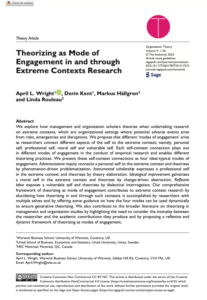 This Thursday we will meet and discuss a recent publication within the team. The idea is to map and discuss who we are as researchers, if we change, and the consequences of this on our research. This is in an attempt to open up the discussion for more inclusive approaches to research.
This Thursday we will meet and discuss a recent publication within the team. The idea is to map and discuss who we are as researchers, if we change, and the consequences of this on our research. This is in an attempt to open up the discussion for more inclusive approaches to research.
This is the paper to be discussed:
Wright, A. L., Kent, D., Hällgren, M., & Rouleau, L. (2023). Theorizing as Mode of Engagement in and through Extreme Contexts Research. Organization Theory, 4(4)
Mini In Extremis Ethnography conference in Skeppsvik
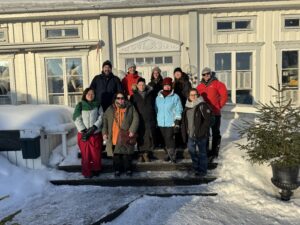 For the past two days, TripleEd and guests (14 of us across the two days) have enjoyed discussing the joys and struggles of doing and publishing ethnographic research in Skeppsvik. Days filled with laughter, candid sharing, and adventure put academia in its best light.
For the past two days, TripleEd and guests (14 of us across the two days) have enjoyed discussing the joys and struggles of doing and publishing ethnographic research in Skeppsvik. Days filled with laughter, candid sharing, and adventure put academia in its best light.
Topics discussed include but were not limited to how to select data in a vast material, accessing settings that may be psychologically (or physically) difficult to handle without getting hurt, navigating IRBs, departmental and academic quirks, video ethnographic work, favorite papers, the challenges of developing academic illustrations, and the challenges and benefits of interdisciplinary research.
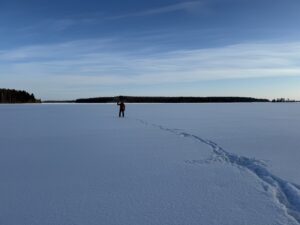 Besides great discussions, Skeppsvik Herrgård delivered a beautiful, calm winter landscape, blue skies, and slowly falling snowflakes with great food. Activities also included proper Northern Sweden “korvgrillning” (one has to use Falukorv, without mustard or ketchup…) with milk chocolate, seeing an eagle floating across the sea, and snowmobiling (a lucky person, Markus could even take the snowmobile to work….)
Besides great discussions, Skeppsvik Herrgård delivered a beautiful, calm winter landscape, blue skies, and slowly falling snowflakes with great food. Activities also included proper Northern Sweden “korvgrillning” (one has to use Falukorv, without mustard or ketchup…) with milk chocolate, seeing an eagle floating across the sea, and snowmobiling (a lucky person, Markus could even take the snowmobile to work….)
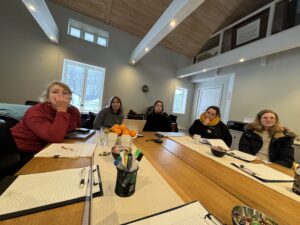
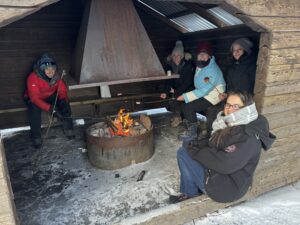

New doctoral student – WELCOME Natalie Toft
 A lot going on at the same time! We have the absolute pleasure of welcoming Natalie Toft to the TripleEd team. Natalie will be working with Sophie and Markus on the hybrid leadership in the incident command system project and thus closely following the Police ICS in the Northern region for an extended period of time. Welcome, Natalie; we are excited that you chose to join us!
A lot going on at the same time! We have the absolute pleasure of welcoming Natalie Toft to the TripleEd team. Natalie will be working with Sophie and Markus on the hybrid leadership in the incident command system project and thus closely following the Police ICS in the Northern region for an extended period of time. Welcome, Natalie; we are excited that you chose to join us!
Seminar with Robin Burrow on “Publishing Multiple Papers from Ethnographic Research”
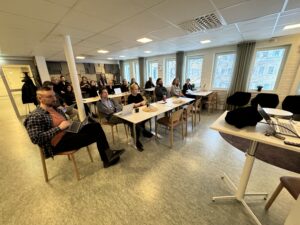
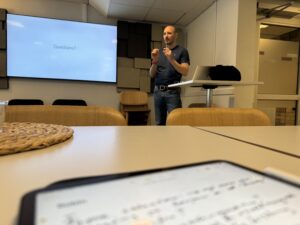 Today we had the great pleasure of listening to Robin Burrow giving a presentation on “Publishing Multiple Papers from Ethnographic Research”. It is not our intention to wear him out, but when you are doing interesting stuff (and are ok with it) and is here for a longer period of time, we can’t but continue involving him! Some really thoughtful and interesting reflections on Robin’s work with highly skilled chefs from all over the world were shared with TripleEd and invited guests from the department!
Today we had the great pleasure of listening to Robin Burrow giving a presentation on “Publishing Multiple Papers from Ethnographic Research”. It is not our intention to wear him out, but when you are doing interesting stuff (and are ok with it) and is here for a longer period of time, we can’t but continue involving him! Some really thoughtful and interesting reflections on Robin’s work with highly skilled chefs from all over the world were shared with TripleEd and invited guests from the department!